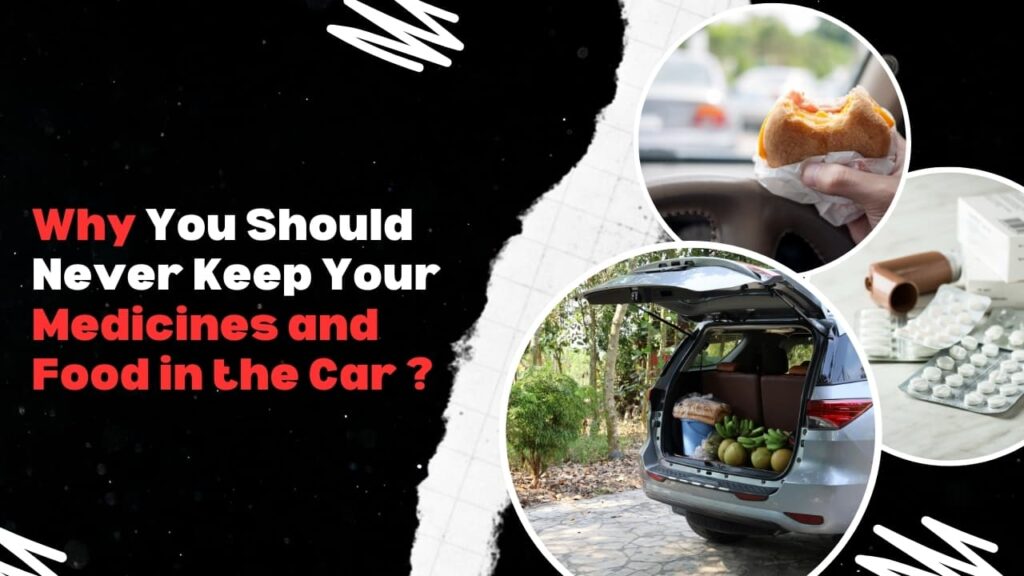Last updated on May 20th, 2025 at 05:27 pm
 Ever left food or medicines in your car? It might seem harmless, but it could seriously affect your health!
Ever left food or medicines in your car? It might seem harmless, but it could seriously affect your health!
A True Story:
Imagine this – you’re driving back home after a long day. You bought some groceries, including fresh vegetables and your prescribed medicines. Tired, you decide to leave everything in the car, planning to get it later. Hours pass, and by the time you remember, the inside of the car is scorching. The food has spoiled, and your medicines? They’re not just sitting there harmlessly – the heat has likely destroyed their effectiveness. What seemed like a small oversight could now impact your health and safety.
Here’s why you should always bring them inside with you.
1. Extreme Temperatures Damage Medicine Potency
- Heat Exposure: Even on a moderately warm day, cars can heat up quickly and reach temperatures of above 70°C (160°F). This is known as heat exposure. Many medications’ chemical makeup may be disrupted by this, rendering them hazardous or ineffective.
- Cold Exposure: Conversely, freezing temperatures have the potential to solidify drugs, especially liquids or insulin, making them useless.
- Solution: The recommended way to keep drugs effective is to store medicines in a dry, cold place, as instructed on the labels.
2. Food Spoilage in High Heat
- Bacterial Growth: The optimal temperature range for bacteria to grow is between 4°C and 60°C (40°F and 140°F). Perishable foods can quickly reach this temperature range in a heated car, leading to the risk of food poisoning and bacterial development.
- Solution: Stay clear of keeping perishables in the car for a duration of two hours or more, especially meat, dairy, and packed lunches.
3. Risk of Chemical Reactions in Medicines
- Chemical Breakdown: Some medicines are heat-sensitive. Antibiotics, hormone supplements, and painkillers, for example, might change chemically when exposed to high temperatures over a long amount of time. These modifications can end up in toxic byproducts, making it dangerous to take the treatments.
- Solution: Take care where you keep your drugs, especially in your automobile, to avoid this. The packaging of many drugs specifies the ideal temperature for storage. You can help to ensuring the efficacy and safety of your medications by sticking to these guidelines.
4. Packaging Damage
- Melted Packaging: The heat inside a car can melt plastic pill bottles, blister packs, or food containers, contaminating the contents with chemicals from the packaging.
- Leaks and Spills: Liquid medicines or food items stored in non-durable containers may burst or leak in the heat, leading to mess and contamination.
- Solution: Always store medicines and food in appropriate conditions to avoid damage to their packaging.
5. Loss of Label Information
- Fading Labels: Prolonged exposure to sunlight can cause medication labels to fade, making it difficult to read dosage or expiration details.
- Solution: Keeping your medicines in proper storage ensures you always have clear, legible instructions.
6. Reduced Shelf Life
- Faster Expiration: Medicines and food exposed to improper storage conditions tend to degrade faster, leading to a shortened shelf life.
- Spoiled Ingredients: In food, prolonged heat or cold can spoil even shelf-stable items like chips or cereal, altering taste and quality.
- Solution: Check storage instructions carefully and keep your products at home in safe environments.
7. Unpleasant Odor and Taste
- Degraded Flavor: Hot or humid conditions can ruin the flavor and texture of both food and medicines, making them taste odd or smell bad.
- Stale Smell: Food left in the car may develop a stale or sour odor, even if it’s pre-packaged.
- Solution: Always take food and medicines out of the car to keep them fresh and pleasant.
Conclusion: Keep Your Health Protected
Your car is a convenience, but not a safe place for your medicines and food. Leaving them in a hot or cold car can lead to health risks, wasted products, and unpleasant surprises.
Tip: Always take your food and medications with you or keep them in a safe, temperature-controlled environment to ensure their quality and your health.
Remember: Storing your medicines and food correctly is essential for your safety. Follow Medkart Pharmacy for more health tips and product safety advice!